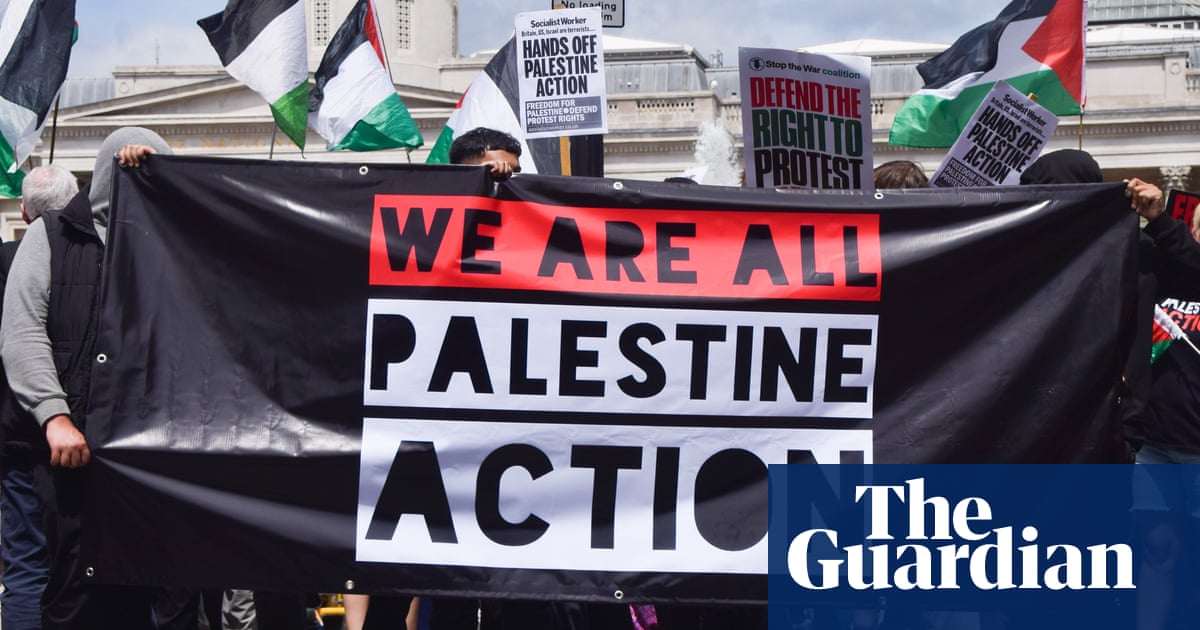The home secretary is coming under increasing pressure to abandonplans to ban Palestine Action, as UN experts and hundreds of lawyers warned that proscribing the group would conflate protest and terrorism.
In two separate letters toYvette Cooper, the Network for Police Monitoring (Netpol) lawyers’ group and the Haldane Society of Socialist Lawyers said that proscribing the group would set a dangerous precedent.
Additionally, several UN special rapporteurs, including those for protecting human rights while countering terrorism and for promoting freedom of expression,said they had contacted the UK governmentto say that “acts of protest that damage property, but are not intended to kill or injure people, should not be treated as terrorism”.
On Tuesday, two people were arrested after Palestine Action claimed to have blockaded the entrance of an Israeli defence company’s UK headquarters.
Avon and Somerset police said a 30-year-old woman and a 36-year-old man, both from London, were arrested on suspicion of criminal damage, unauthorised entry to a prohibited place and locking on to a person, object or land to cause serious disruption.
Earlier, a Palestine Action spokesperson said activists had blocked the entrance to Elbit Systems in Bristol and covered it in red paint “to symbolise Palestinian bloodshed”.
The Netpol lawyers’ group letter, shared exclusively with the Guardian, was signed by 266 solicitors, barristers and legal academics, including 11 KCs and 11 law professors. “Proscription of a direct-action protest group is an unprecedented and extremely regressive step for civil liberties,” they write. “The conflation of protest and terrorism is the hallmark of authoritarian regimes. Our government has stated that it is committed to respecting the rule of law: this must include the right to protest.
“To use the Terrorism Act to ban Palestine Action from direct action would be an abuse of this legislation and an interference with the right to protest. Misusing terrorism legislation in this way against a protest group sets a dangerous precedent, threatens our democratic freedoms, and would be a terrifying blow to our civil liberties.”
Signatories ofthe Haldane Society letter, which will be handed to Cooper before MPs vote on Wednesday, include Michael Mansfield KC and Imran Khan KC – who represented the family of Stephen Lawrence and victims of the Grenfell Tower fire – and the Labour peer John Hendy KC.
It has been signed by thousands of people including the politicians Caroline Lucas, Jeremy Corbyn and John McDonnell, the actors Adeel Akhtar and Juliet Stevenson, teachers and vicars.
The letter says: “It [a ban] would leave many ordinary members of the public vulnerable – for example, simply wearing a T-shirt saying ‘I support Palestine Action’ would be seen as violating the proscription and action would need to be taken.
“There are many dangers to proscribing peaceful direct action groups, even if their objectives are those some of us may disagree with. Current and future governments may misuse this precedent to attack other interest groups in future, offering no avenues for peacefully venting dissent.”
The prime minister, Keir Starmer, was a member of the Haldane Society but left when he became director of public prosecutions in 2008.
The UN experts said: “Mere property damage, without endangering life, is not sufficiently serious to qualify as terrorism …Protestactions that are not genuinely ‘terrorist’, but which involve alleged property damage, should be properly investigated as ordinary crimes or other security offences.”
The Home Office referred the Guardian toCooper’s statement last weekannouncing the proposed ban, and comments in a press release issued on Monday in which she said that Palestine Action’s acts “do not represent legitimate acts of protest and the level of seriousness of Palestine Action’s activity has met the test for proscription under the Terrorism Act 2000”.
